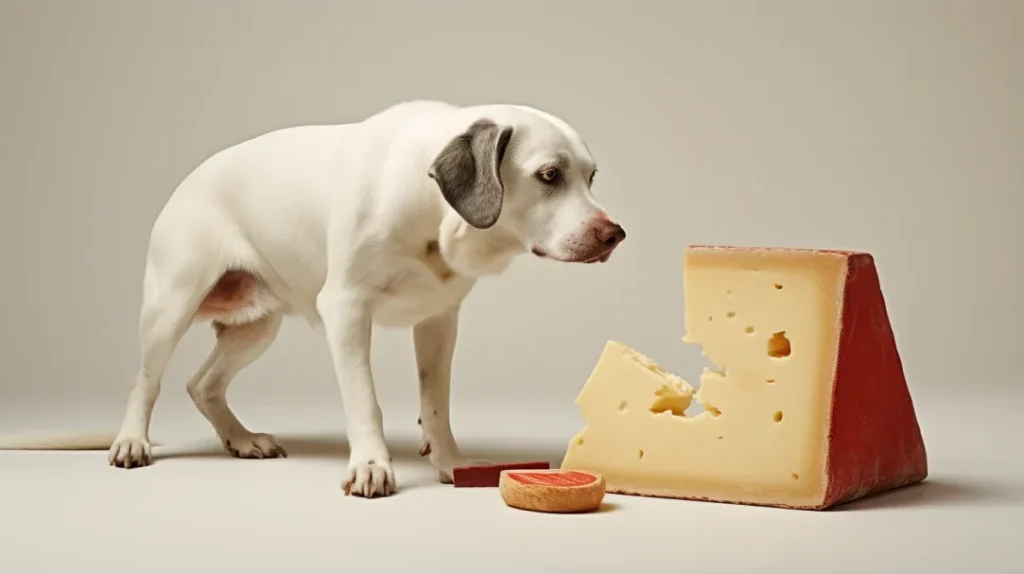Discover the delightful dilemma of whether your furry friend can safely savor scrumptious Gouda cheese! This informative article will unveil the cheese mystery: Can dogs eat gouda cheese? And provide evidence-based insights on dogs and Gouda cheese.
Find out the nutritional value of this delectable dairy delight, understand potential risks, and explore safe serving sizes. With expert veterinarian recommendations, you’ll know whether Gouda is a go for your pup’s palate.
Let’s embark on this cheesy adventure together!
Key Takeaways Of “Can Dogs Eat Gouda Cheese”
- While gouda cheese can be a tasty treat for your furry friend, it’s important to remember that moderation is vital. Dogs can enjoy gouda cheese safely if it is introduced gradually and in small portions.
- Gouda cheese provides calcium and protein but should not replace regular dental care practices.
- Feeding Gouda cheese to dogs can pose risks such as high-fat content leading to pancreatitis, lactose intolerance causing digestive issues, and excessive sodium intake leading to dehydration and kidney strain.
- Dogs with lactose intolerance may experience digestive issues when consuming Gouda cheese, and alternative cheese options are available for dogs with dietary restrictions.
- It is recommended to avoid feeding Gouda cheese to dogs due to the risk of mold contamination and mycotoxin ingestion, as well as the potential for lactose intolerance-related discomfort.
What Cheese Can Dogs Eat?
Cheese can be a tasty treat for dogs, but not all cheese types are safe to enjoy. When it comes to gouda cheese, dogs can indeed eat it safely. It’s essential to choose the right kind of cheese for your pup. Some dogs may be lactose intolerant or sensitive to dairy products, causing stomach upset or diarrhea. Soft and processed cheeses like blue cheese and cream cheese should be avoided, as they are high in fat and may contain artificial ingredients.
Gouda cheese is a popular cheese variety that is safe for dogs to consume in moderation. It is low in lactose and typically does not cause any gastrointestinal issues or upset stomachs. However, as with any treat, feeding gouda cheese to dogs in small quantities is essential.
Cheese, including gouda, can be a good source of protein and calcium for dogs. It can also serve as a delicious and healthy food. However, it is essential to remember that some dogs may have a sensitivity or allergy to dairy products. If you notice any adverse reactions or gastrointestinal issues after feeding your dog gouda cheese, it is best to consult with a veterinarian.
Finally, gouda cheese is safe and tasty for dogs in moderation. Ensure the cheese lacks artificial or hazardous additives, and watch your dog’s behavior while trying new foods.
The Benefits of Gouda Cheese
Gouda cheese can provide several benefits for dogs when given in moderation. It is a good source of protein and calcium, necessary for maintaining strong muscles and bones. Besides its nutritional value, gouda cheese can be a tasty and healthy occasional dog treat.
However, it is essential to consider that not all dogs can tolerate dairy products. Some may have sensitivities or allergies, resulting in gastrointestinal issues or adverse reactions. If you notice any signs of stomach upset or other adverse reactions after feeding your dog gouda cheese, it is best to seek advice from a veterinarian.
To ensure that gouda cheese remains a safe treat, it should be fed in small quantities. This will prevent an excessive intake of fat and sodium, which can lead to health issues such as obesity and high blood pressure. By offering gouda cheese as a special treat, dogs can enjoy its delicious taste while maintaining a balanced diet.
The Nutritional Value of Gouda Cheese for Dogs
Gouda cheese can provide dogs with calcium and protein, making it a nutritious treat option. However, when it comes to the taste of gouda cheese for dogs, it may vary from one dog to another. Some dogs may find the creamy and slightly nutty flavor of Gouda cheese appealing, while others may show little interest in it. Gouda cheese can cause weight gain and digestive difficulties in pets, so offer it in moderation.
Dog teeth can also benefit from gouda cheese. A tiny piece of gouda cheese can remove plaque and tartar from their teeth. The chewing stimulates saliva production, which helps wash away harmful bacteria in the mouth. However, it’s crucial to remember that gouda cheese should never replace regular dental care practices, such as brushing your dog’s teeth or providing them with appropriate chew toys.
Types of Cheese: Hard vs. Soft
Cheese lovers know that there are countless varieties of this delicious dairy delight. From mild and creamy to sharp and tangy, each type of cheese has a unique flavor and texture. One way to categorize cheese is its consistency, specifically whether it is hard or soft.
- As the name suggests, hard cheeses are firm and dense in texture. They often have a drier and crumbly consistency, making them perfect for grating or shredding. Some famous examples of hard cheeses include cheddar, Parmesan, and Gouda. These cheeses undergo a lengthy aging process, giving them distinct flavors and sharper profiles.
- On the other hand, soft cheeses are smooth and spreadable. They have a higher moisture content, resulting in a creamy and sometimes runny texture. Soft cheeses are often enjoyed as a spread on crackers or bread. Some well-known soft cheeses include Brie, Camembert, and feta. These cheeses are usually milder in taste and have a slightly tangy or salty flavor.
- The difference in texture between hard and soft cheeses is mainly due to the moisture content and aging process. Hard cheeses have less moisture and undergo a longer aging period, resulting in a more concentrated flavor. Soft cheeses, on the other hand, have higher moisture levels and are usually consumed fresh or within a shorter aging time.
- Both hard and soft cheeses offer unique qualities when it comes to incorporating cheese into your meals. Hard cheeses are great for grating over pasta dishes or melting on a gooey cheese sandwich. Soft cheeses are perfect for adding to salads, spreading on crackers, or enjoying themselves.
Whether you prefer the crumbly and bold taste of hard cheese or the creamy and indulgent texture of soft cheese, there is sure to be a type of cheese that suits your palate. So why not explore the world of cheese and discover new flavors and textures to enhance your favorite dishes?
Understanding the Potential Risks of Gouda Cheese for Dogs

Although gouda cheese may be a tempting treat for our furry friends, it is essential to understand the potential risks it poses to dogs. While dogs can enjoy certain types of cheese in moderation, gouda cheese can be problematic for their digestive systems.
Here are some of the dangers of gouda cheese for dogs:
- High-fat content: Gouda cheese is known for its rich and creamy texture but also has a high-fat content. Consuming too much fat can lead to pancreatitis in dogs, a painful pancreas inflammation.
- Many dogs are lactose intolerant and lack the enzymes to digest it. Feeding them cheese can result in digestive issues such as diarrhea, bloating, and gas.
- Sodium overload: Gouda is often high in sodium, which can harm dogs. Dehydration and renal strain can result from excessive salt intake.
Avoid giving your pet gouda cheese or other high-fat dairy items to keep them healthy. Select dog-friendly treats that meet their nutritional demands.
Gouda Cheese: Is It Safe for Dogs With Lactose Intolerance

If your dog has lactose intolerance, it’s essential to understand the potential risks of feeding them gouda cheese. While it may be tempting to share this creamy and delicious cheese with your furry friend, gouda contains lactose, which can cause digestive issues in dogs with lactose intolerance.
However, there are alternative cheese options available that are safe for dogs with dietary restrictions.
Lactose Intolerance in Dogs
Dogs with lactose intolerance may experience digestive issues when consuming dairy products. While some dogs can tolerate small amounts of lactose, others lack the necessary enzyme, lactase, to digest it properly. Here are some key points to consider about lactose intolerance in dogs:
Can dogs digest lactose?
- Dogs have a limited ability to digest lactose due to low lactase levels.
- Lactase simplifies lactose for absorption.
- Without enough lactase, undigested lactose can ferment in the gut and cause discomfort.
Can lactose intolerance be dangerous for dogs?
- In most cases, lactose intolerance in dogs leads to mild digestive upset like diarrhea or gas.
- However, severe reactions such as vomiting or dehydration may occur if large amounts of dairy are consumed.
- It’s essential to monitor your dog’s reaction to dairy and consult a veterinarian if any concerning symptoms arise.
Understanding your dog’s ability to digest lactose is crucial for their well-being.
Risks of Feeding Gouda
When feeding your dog Gouda, knowing the potential risks is crucial. While dogs can enjoy certain types of cheese in moderation, Gouda may not be the best choice due to the dangers of mold and the potential digestive issues it poses.
One of the primary concerns with Gouda cheese is the risk of mold contamination. Mold growth on cheese can produce mycotoxins, which harm humans and animals. Ingesting moldy Gouda can lead to symptoms such as vomiting, diarrhea, and even neurological problems in dogs.
Furthermore, Gouda contains lactose, a sugar in milk products that many dogs have difficulty digesting. Lactose intolerance can cause gastrointestinal discomfort like gas, bloating, and diarrhea.
To ensure your dog’s safety, it’s recommended to avoid feeding them Gouda cheese altogether. If you want to offer them a treat or reward, consider options made explicitly for canine consumption or consult your veterinarian for suitable alternatives.
Popular Options for Dog-Friendly Cheeses
If you’re looking for dog-friendly cheeses, there are some popular options. Cottage cheese is an excellent choice as it is low in fat and sodium. It also provides a good source of protein for your furry friend. Another option is plain cream cheese, which is generally safe for dogs in moderation. Just be mindful of the serving size due to its high-calorie content.
Swiss cheese, which has less fat and sodium, is also dog-friendly. Dogs have an easier time digesting goat cheese. However, cheese must not contain harmful components like garlic or onion. Introduce new foods carefully and in moderate amounts to avoid digestive difficulties. Your dog should only eat cheese as a treat.
Now, let’s explore how to introduce gouda cheese to your dog’s diet.
How to Introduce Gouda Cheese to Your Dog’s Diet

When introducing Gouda cheese to your dog’s diet, it is essential to consider the portion size. Start with small amounts and gradually increase as you observe how your dog reacts to it.
Additionally, use cheese as a training tool and reward for good behavior, as dogs often find it highly motivating.
However, be mindful of the overall calorie intake from cheese and adjust their regular meals accordingly to maintain a balanced diet.
Cheese Portion Size
Limiting their cheese portion size is essential to ensure your dog’s safety and health. Cheese can be a tasty treat for dogs, but it should be given in moderation to prevent weight gain and other potential health issues.
Here are some reasons why cheese portion control is essential:
- Excess calories: Fat and calorie counts can quickly rise when cheese is the primary source of nourishment. Dogs can become overweight as a result of this.
- Digestive upset: Dogs have difficulty digesting lactose in dairy products like cheese. Overconsumption can cause gastrointestinal discomfort, such as diarrhea or vomiting.
- Nutritional imbalance: Too much cheese can disrupt the balance of nutrients in your dog’s diet, potentially leading to deficiencies or excesses.
Training and Rewards
Now that you know how much cheese is safe for your furry friend, let’s discuss training techniques and positive reinforcement. These methods are crucial in teaching your dog new skills and behaviors.
Positive reinforcement involves rewarding your pup for good behavior, which can be done through treats or praise.
When it comes to training, consistency is critical. Use clear cues and commands; always reward your dog when it responds correctly. This will help reinforce the desired behavior and encourage them to repeat it in the future.
Training techniques like clicker training can also be effective. Using a clicker to mark the exact instant your dog performs the desired behavior helps you communicate.
Moderation Is Key: The Ideal Serving Size of Gouda Cheese for Dogs
If you’re wondering how much gouda cheese is safe for your furry friend, the ideal serving size for dogs would be small, occasional pieces. While cheese can be a tasty and enticing dog treat, it should be given in moderation to avoid potential health issues.
Here are a few key points to keep in mind when it comes to portion control and treating your dog with gouda cheese:
- Dogs have different nutritional needs than humans, so it’s essential to consider their size and overall diet when determining the appropriate serving size of gouda cheese.
- Cheese should only make up a small part of your dog’s daily calorie intake as it is high in fat and calories.
- Gouda cheese can be used as a training treat, but the joy should comprise at most 10% of your dog’s daily caloric intake.
Gouda Cheese and Canine Allergies: What You Need to Know
When introducing gouda cheese to your dog, you must know the potential for canine allergies. While gouda cheese can provide some nutritional benefits, such as protein and calcium, it may only be suitable for some dogs due to their unique digestive systems.
Canine digestion differs from humans, and certain foods can cause allergic reactions or gastrointestinal issues in dogs. Gouda cheese contains lactose, which some dogs may have difficulty digesting, leading to symptoms like diarrhea or gas. If you notice any discomfort after giving your dog gouda cheese, it’s best to consult a veterinarian before continuing its consumption.
Now that you understand the potential risks associated with gouda cheese and canine allergies let’s explore alternatives: other cheese options for dogs.
Exploring Alternatives: Other Cheese Options for Dogs
Are you looking for other options? Try cheddar or mozzarella as alternative cheese choices for your furry friend.
While dogs can enjoy the occasional cheese treat, it’s essential to be mindful of their dietary restrictions, especially if they are lactose intolerant.
Here are a few reasons why cheddar or mozzarella may be better alternatives:
- Cheddar and mozzarella cheeses have lower lactose content than other cheese types, making them more suitable for lactose-intolerant dogs.
- These cheeses still provide the same creamy and savory taste that dogs love without causing digestive discomfort.
- Cheddar and mozzarella also contain essential nutrients like protein and calcium, which benefit your dog’s overall health.
Frequently Asked Questions
Can Dogs Eat Other Types of Cheese Besides Gouda?
Yes, dogs can eat other types of cheese besides gouda. However, it’s essential to consider cheese alternatives for dogs that are safe and suitable for their digestive system. Feeding dogs cheese can have potential risks, such as lactose intolerance and obesity.
How Much Gouda Cheese Can Dogs Safely Consume?
You can safely feed your dog a moderate amount of Gouda cheese. Too much can lead to digestive issues and weight gain. Remember, moderation is vital for maintaining canine health.
Are There Any Health Benefits of Feeding Smoked Gouda Cheese to Dogs?
Feeding smoked gouda cheese to dogs may pose health risks. While it can be a tasty treat, some dogs may struggle with lactose intolerance. Consider alternatives like lactose-free cheese or other dog-friendly snacks.
Can Dogs Develop an Allergy to Gouda Cheese?
You might wonder if dogs can react adversely to Gouda cheese or if it’s safe for dogs with lactose intolerance. It’s essential to consider these factors before giving your furry friend a taste.
How Can Dogs With Lactose Intolerance Be Treated?
Dogs with lactose intolerance have diarrhea, flatulence, and vomiting. If your dog is lactose intolerant, manage their condition by avoiding dairy products or using lactose-free alternatives. Consult with a veterinarian for proper guidance.
Conclusion
In conclusion, while gouda cheese can be a tasty treat for your furry friend, it’s important to remember that moderation is key. Dogs can enjoy gouda cheese safely if it is introduced gradually and in small portions.
However, if your dog has lactose intolerance or allergies, it may be best to explore other cheese options. It is imperative to seek guidance from a veterinarian before implementing any modifications to a canine’s dietary regimen.
Remember, their health and well-being should always be our top priority.
Quick Paw Note: While we’re passionate about providing helpful pet nutrition content, it’s essential to remember that this info isn’t a substitute for professional veterinary advice. Always consult your vet for your pup’s specific dietary needs. We strive for accuracy, but paw-lease note that we can’t guarantee the complete reliability of all content. Stay pawsome! 🐾




